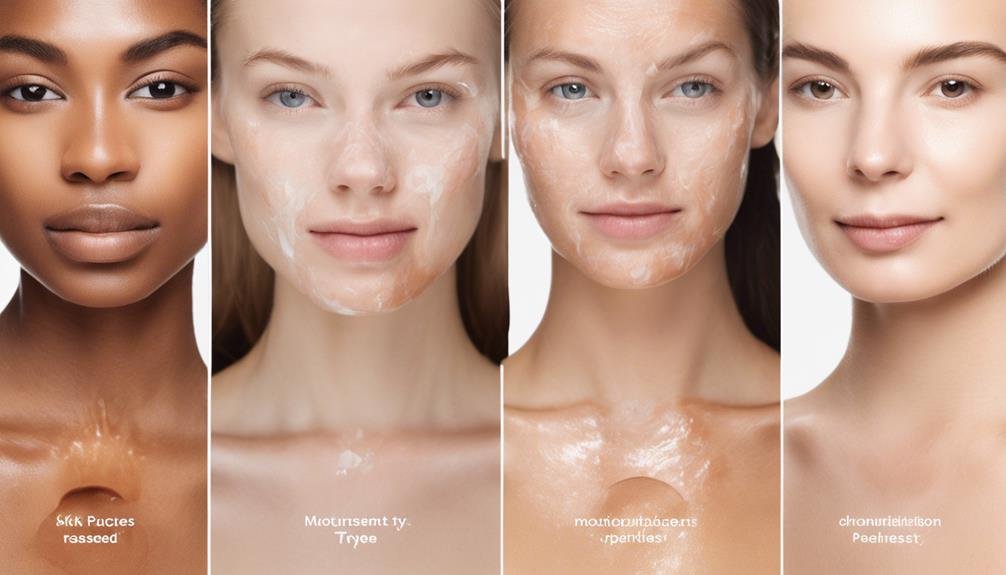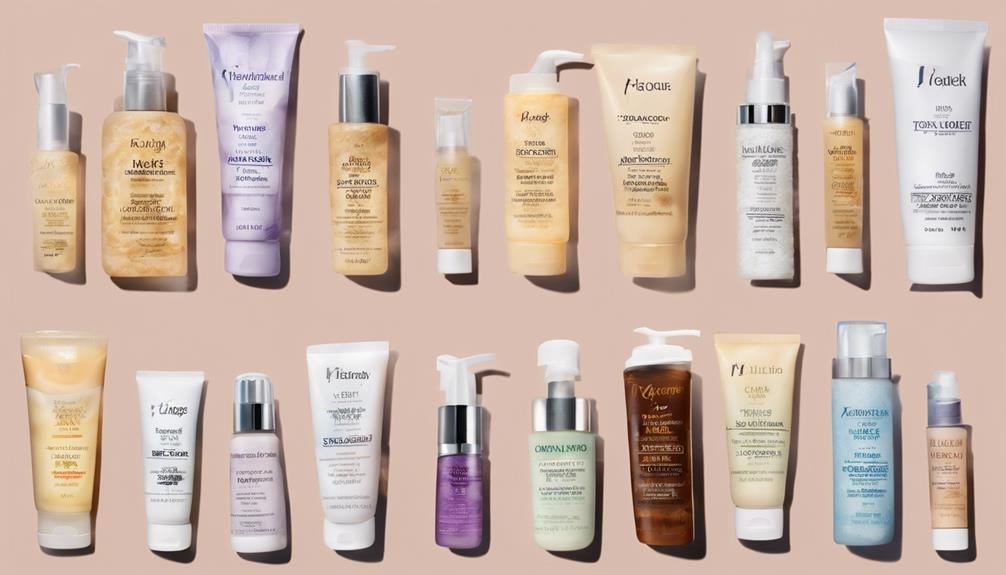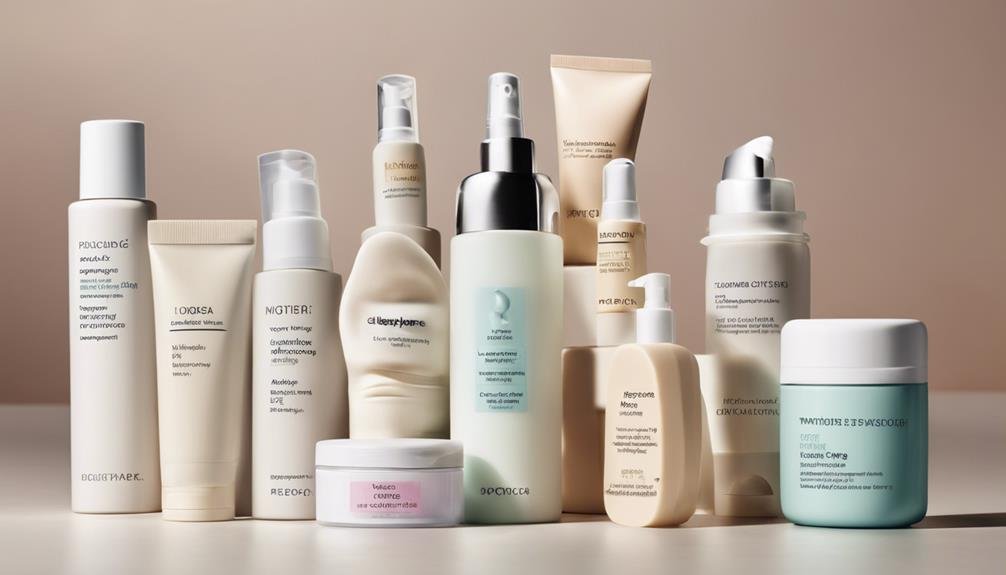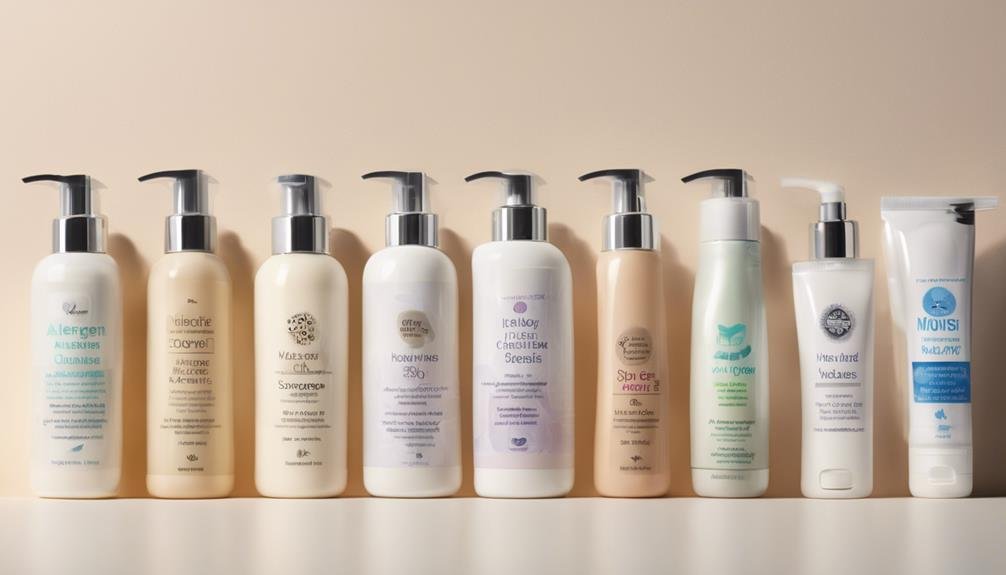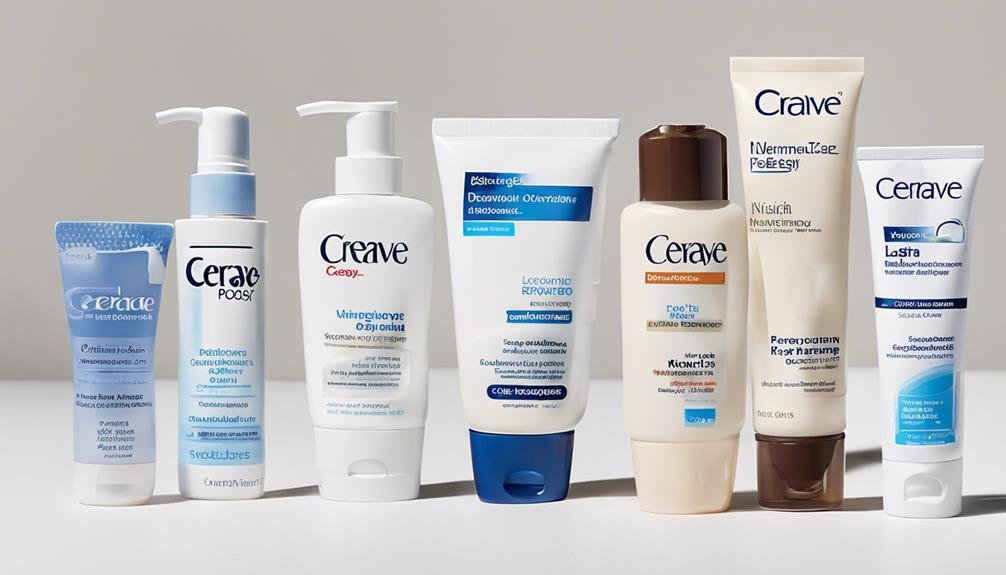When selecting the best moisturizer for your skin, it's crucial to consider multiple factors that can impact its efficacy. Your skin type, key ingredients, texture preferences, SPF protection, and fragrance-free options all play a role in finding the perfect match. By understanding these elements and exploring various options, you can ensure that your skin receives the care it deserves. But how do you navigate this vast array of choices and pinpoint the ideal moisturizer for your unique needs?
Skin Type Assessment
When determining the best moisturizer for your skin, the first step is to assess your skin type. Understanding your skin's hydration levels and oil production is crucial in selecting the most suitable product. If your skin tends to feel dry and tight, it indicates low hydration levels, while excessive oiliness suggests overactive oil glands.
For dry skin, opt for a moisturizer with hydrating ingredients like hyaluronic acid or glycerin to boost moisture levels. Look for non-comedogenic formulas to prevent clogged pores and breakouts if you have oily skin. Combination skin, characterized by both dry and oily areas, benefits from lightweight, oil-free moisturizers that balance hydration without clogging pores.
Knowing your skin type allows you to tailor your skincare routine effectively. By addressing specific concerns such as hydration and oil production, you can select a moisturizer that meets your skin's unique needs, promoting a healthy and radiant complexion. Take the time to assess your skin type to make informed decisions when choosing the best moisturizer for you.
Understanding Key Ingredients
Assessing your skin type is the initial step in finding the most suitable moisturizer. Understanding key ingredients in your moisturizer can help you cater to the specific needs of your skin. Ingredients like hyaluronic acid provide deep hydration, while antioxidants like Vitamin C protect your skin from environmental damage. Look for ingredients such as retinol to combat signs of aging, and niacinamide to reduce redness and inflammation.
Consider your skin reactions when choosing a moisturizer. If you have sensitive skin, opt for products with soothing ingredients like aloe vera or chamomile. For oily skin, look for oil-free and non-comedogenic formulas to prevent breakouts. Dry skin benefits from ingredients like glycerin and shea butter that provide intense moisture.
Texture and Consistency Preferences
To select the ideal moisturizer for your skin, considering your preferences for texture and consistency is crucial. The texture of a moisturizer can greatly impact your hydration levels and address specific skin concerns. If you have dry skin, you may prefer a richer, creamier texture to provide intense hydration. In contrast, individuals with oily skin might opt for a lightweight, gel-like consistency to prevent excess oiliness.
Moreover, seasonal changes can influence your texture preferences. In the colder months, a thicker moisturizer can help combat dryness, while a lighter formula may be preferred during the warmer seasons to prevent feeling heavy on the skin.
Consider your makeup application routine as well. A moisturizer that absorbs quickly and leaves a smooth finish can serve as a great base for makeup, enhancing its longevity and overall appearance. Take these factors into account when choosing a moisturizer that not only suits your skin type and concerns but also aligns with your texture and consistency preferences.
SPF Protection Consideration
Considering the importance of protecting your skin from harmful UV rays, incorporating SPF protection into your daily skincare routine is paramount.
When selecting a moisturizer, opt for one that offers broad-spectrum protection against both UVA and UVB rays. Ensure that the SPF level is appropriate for your skin type and the intensity of sun exposure you typically experience. Look for moisturizers labeled as "sunscreen compatible" to avoid any potential interactions between the products.
For effective protection, remember that daily application of SPF is crucial, even on cloudy days or during winter months. Make it a habit to apply your moisturizer with SPF as the final step in your morning skincare regimen. This won't only shield your skin from sun damage but also help in preventing premature aging and reducing the risk of skin cancer.
Fragrance-Free Options
For those seeking skincare products that cater to sensitive skin or prefer minimalistic formulas, exploring fragrance-free options in moisturizers can offer a beneficial solution. Fragrances in skincare products can sometimes irritate sensitive skin, leading to redness, itching, or even allergic reactions. Opting for fragrance-free moisturizers can help avoid these issues while still providing the hydration benefits your skin needs. Here are some top fragrance-free moisturizers to consider:
| Moisturizer | Skin Type | Key Benefits |
|---|---|---|
| CeraVe Moisturizing Cream | Sensitive Skin | Hydrates and restores the skin barrier |
| Neutrogena Hydro Boost Gel-Cream | All Skin Types | Lightweight, non-greasy, boosts hydration |
| La Roche-Posay Toleriane Double Repair Face Moisturizer | Dry, Sensitive Skin | Restores skin's natural protective barrier, soothes irritation |
These fragrance-free options focus on providing intense hydration without the risk of irritation, making them ideal choices for those with sensitive skin concerns.
Anti-Aging Properties
When exploring moisturizers with anti-aging properties, it's essential to look for key ingredients that target fine lines, wrinkles, and overall skin elasticity. To combat signs of aging effectively, opt for moisturizers that offer hydration benefits while aiding in wrinkle reduction. Ingredients like hyaluronic acid, retinol, peptides, and vitamin C are known for their anti-aging properties.
Hyaluronic acid is excellent for locking in moisture, plumping the skin, and reducing the appearance of fine lines. Retinol helps to stimulate collagen production, improving skin texture and minimizing wrinkles. Peptides assist in boosting skin elasticity, while vitamin C brightens the skin tone and protects against free radicals that contribute to aging.
When selecting an anti-aging moisturizer, prioritize products that cater to your specific skin concerns, whether it's dryness, sagging skin, or fine lines. Look for formulations that offer a balance of hydration and potent ingredients for optimal results in wrinkle reduction and overall skin rejuvenation.
Allergen-Free Formulas
Prioritizing skin health involves selecting moisturizers with allergen-free formulas. For those with sensitive skin or prone to allergies, opting for hypoallergenic options can help prevent adverse reactions. These formulas are designed to minimize the risk of triggering skin allergies, making them ideal for individuals with delicate skin types.
Consider the following table to help you navigate through allergen-free moisturizer options:
| Brand | Product Name | Key Features |
|---|---|---|
| CeraVe | Hydrating Cream | Developed with dermatologists, suitable for sensitive skin. |
| La Roche-Posay | Toleriane Double Repair Face Moisturizer | Non-comedogenic, fragrance-free, and tested on sensitive skin. |
| Aveeno | Ultra-Calming Daily Moisturizer | Infused with feverfew and suitable for sensitive skin types. |
When choosing a moisturizer, look for labels that specify "hypoallergenic" or "for sensitive skin" to ensure you are selecting a product that caters to your skin's needs.
Budget-Friendly Choices
Amidst the vast array of skincare products, finding a moisturizer that fits your budget without compromising quality is essential. Luckily, there are plenty of budget-friendly options available, including drugstore finds and affordable choices that can provide your skin with the hydration it needs.
When looking for a moisturizer on a budget, drugstore finds can be a great place to start. Brands like Cetaphil, Neutrogena, and Cerave offer effective moisturizers at a fraction of the cost of high-end products. These options often contain beneficial ingredients like hyaluronic acid, glycerin, and ceramides to keep your skin moisturized and healthy.
Additionally, many skincare brands offer affordable options that cater to various skin types and concerns. Look for moisturizers that are oil-free, non-comedogenic, and suitable for sensitive skin to ensure they meet your specific needs without breaking the bank.
Dermatologist-Recommended Brands
Exploring dermatologist-recommended brands for moisturizers can provide you with confidence in your skincare choices. When it comes to selecting a moisturizer that suits your skin's needs, turning to top picks from professional recommendations can be a game-changer. Dermatologists often suggest brands that have undergone rigorous testing and contain ingredients that are proven to be effective and safe for various skin types.
Some of the top picks in dermatologist-recommended brands include CeraVe, La Roche-Posay, and Neutrogena. These brands are known for their high-quality formulations that cater to different skin concerns, from dryness to acne-prone skin. By opting for a moisturizer from a brand endorsed by dermatologists, you can feel assured that you're investing in a product that has been vetted by skincare experts.
When considering moisturizers, remember that what works best for one person may not work for another.
However, starting with dermatologist-recommended brands can significantly increase your chances of finding a product that aligns with your skin's needs and preferences.
Trial and Error Process
Navigating the world of skincare involves a significant trial and error process. When it comes to finding the best moisturizer for your skin, product testing is key. It's essential to remember that what works for someone else may not work for you.
Start by selecting a moisturizer that aligns with your skin type and concerns. Test a small amount on a patch of skin to check for any adverse reactions.
Consider your skin's sensitivity and the compatibility of ingredients with your skin type. If you notice any redness, itching, or irritation, discontinue use immediately. Sometimes, certain ingredients may not agree with your skin, leading to unwanted reactions.
Keep a keen eye on how your skin responds to different moisturizers to determine the best fit for you.
Frequently Asked Questions
Can I Use the Same Moisturizer for Day and Night?
You can use the same moisturizer for day and night if it meets your skin needs. Different formulations cater to specific concerns like hydration or repair. Choose a versatile option that suits your skin.
How Long Should I Wait Before Applying Makeup After Moisturizing?
Before applying makeup after moisturizing, wait 5-10 minutes for the product to fully absorb. This allows your skin to benefit from the moisturizer's hydration without affecting makeup application. Ensure compatibility to achieve a flawless finish.
Is It Necessary to Use a Separate Eye Cream?
When considering eye cream, remember that there are eye cream alternatives like hydrating eye treatments. These products can provide similar benefits without the need for a separate eye cream, saving you time and money while still nourishing the delicate skin around your eyes.
Can I Mix Different Moisturizers for Specific Skin Concerns?
When addressing specific skin concerns, layering products can be beneficial. Ensure ingredient compatibility to prevent adverse reactions. Mixing moisturizers for different needs is possible, but consider how the products interact for optimal results and skin health.
Should I Apply Moisturizer Before or After Serums?
Before serums, apply moisturizer to create a barrier. Layering products in this order helps lock in moisture and enhance absorption. Ensure product compatibility to maximize benefits. This routine promotes hydrated, nourished skin.
Conclusion
So, now that you've navigated the vast world of moisturizers, you're practically a skincare expert. Remember, finding the perfect moisturizer is like dating – it may take some trial and error before you find "the one." But with your newfound knowledge of skin types, key ingredients, and SPF protection, you're well-equipped to make an informed decision. So go forth, moisturize wisely, and let your skin glow like a radiant beacon of hydration. Cheers to happy, hydrated skin!

